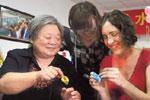Marcos Fava Neves
The Roots of Food and Agribusiness Thinking
Updated: 2010-01-26 10:37
By Marcos Fava Neves (Chinadaily.com.cn)
After our thoughtful agenda of strategic points for this new decade, that closed our articles to China Daily community on 2009, I want to start 2010 talking about history and messages coming from companies. January was a historical moment for Harvard Business School, in Boston. The traditional Cases Seminar completed 50 years of existence. Every year around 200 executives from all continents join to discuss 12 cases of companies that had something new for us to learn and spread this experience towards a more efficient and sustainable world.
The Seminar has an interesting dynamics. Each case is written along the year by a team of Harvard professors and researchers, leaded by David Bell and Mary Shelman. A traditional case has around 20 pages, being ten pages of text and other ten of annexes ( financial and market data). The case reports the historical facts of each company, the moment the company faces, and the major challenges and decisions towards the future, in terms of strategies.
In a case discussion event, like the Harvard Seminar, each participant has access to the HBS web, downloads the cases, materials and instructions, and has to read the case in advance. At the Seminar, each case is than previously discussed with a smaller group of 8 participants, to have a more interactive opinion building process. Then, the case is finally discussed on a plenary, and at the end, the CEO of company comes and answers questions interacting with the audience. It is 4 day event full of immersion. If the participants don’t read the cases in advance, it is going to be very difficult and unpleasant to participate.
Harvard is where the term “agribusiness” was first elaborated, in 1957, by Profs. John Davis and Ray Goldberg, in the book “A Concept of Agribusiness”. The concept had an attempt to bring more integration, considering agriculture an activity strongly linked with suppliers of inputs, service providers, processing industry, distribution systems, financial institutions and consumers. Further on, in 1968, a new publication having Prof. Ray Goldberg as author, emerged. This second book brought the concept of “agribusiness systems”. The difference here is that an agribusiness system considers the flow of one product over an interactive system or food chain. Like the soybean system in China, de pork system, and others. The sum of all the systems operating at a particular country, gives the country’s agribusiness.
Prof. Goldberg is still leading the Seminar, presenting cases and interacting with participants and audience, being an example of vitality and lifestyle. His ideas are very modern, and his discussions and thoughts toward the future give to the audience very special moments.
In the 2010 Seminar, 12 cases were discussed. There is already a tradition in having a case from China, and at least 10 executives from China participate. In 2009, COFCO case was written, presented and discussed. In 2010, DaChan Food Company was on the spotlight. From DaChan we had a description of the company, its origins, the operations on feed, meat, how the company contracts farmers in an integration system of producers, and the most important point was how DaChan developed a reliable system of transparency and traceability for guaranteeing quality for its buyers. DaChan conquered an important position as a major supplier for international foodservice chains operating in Asia. Mr. Mark J.H. Han, Chairman, was there at the end to answer questions and interact. The audience was very pleased that DaChan could build this system to give confidence to consumers, and even Prof. Goldberg highlighted this as a major breakthrough on China’s agribusiness development.
The other cases involved Cosan, which is Brazilian largest ethanol company and the recent growth strategies. This case discussed the outstanding results that Brazil is reaching with ethanol, which will be a further article in our column. Monsanto was also a case, exploring the position of this company in innovation, acquiring seed companies as “transporters of technology” to farmers, and changing communication strategies, towards new trends of farmers. The innovation pipeline was discussed and we can expect in the future more plants resistant to water scarcity. Woolf case explored the production of horticulture and almonds in California, and how water restrictions are threatening future production.
Rabobank, the largest cooperative bank based in the Netherlands was also explored, with its unique characteristics and the future growth strategies, with a focus on food and agribusiness systems. We also had Purecircle that explored the market of stevia based sugar, a natural sweetner, Ebro Puleva, the world’s largest rice company, based in Spain and Hungerit that explores poultry production in Hungary, before and after the communist era.
Interesting experiences also came from GTC Biotherapeutics, a company dedicated to produce medicine and food, providing ingredients, proteins and other medicine based from food and animals. Red Tomato was also a case, and this company is dedicated to link local food producers to supermarkets, being a nice example for China. Another intriguing case was Diamond Foods that started as a farmers’ cooperative and now is the leading company in the almond snacks market in the USA, with farmers as shareholders of this company. A final case was written by us, Codevasf. This is a public company in Brazil that is lending 8000 ha of irrigated land to the private sector in a very interesting bid considering sustainable integration. This will be explored in our next article, since I consider a nice model for Chinese Agribusiness.
The author is professor of strategic planning and food chains at the School of Economics and Business, University of Sao Paulo, Brazil (www.favaneves.org) and international speaker.
Specials

China dream
Popular Bluff, Missouri, native Catherine Beck never imagined her summer experiences in China would change her career course.